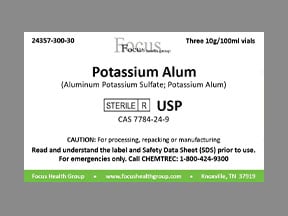
Potassium Alum Coupons & Savings Card – Discount Prices from $76.39
Potassium alum, also known as potassium aluminum sulfate, is a naturally occurring mineral with the chemical formula KAl(SO₄)₂·12H₂O. Historically, it has been utilized for its astringent and antiseptic properties, making it valuable in various applications. In water treatment, potassium alum acts as a coagulant, helping to clarify drinking water by causing impurities to clump together for easier removal. In the cosmetic industry, it is commonly found in deodorants and aftershave products due to its ability to inhibit the growth of odor-causing bacteria and reduce minor bleeding from shaving nicks. Additionally, potassium alum is used in food processing, particularly in pickling, to maintain the crispness of fruits and vegetables. Its versatility and effectiveness have ensured its continued use in these and other applications.
Our coupons are free to use. Before paying, show the pharmacist your Potassium Alum savings card to get your free discount. Use our filters below to edit the prescription box to match your needs. The Potassium Alum prices will update based on your prescription needs. Above our Potassium Alum coupons, you can change your location to see pharmacy prices and costs in other areas. We're here to help you buy Potassium Alum at the lowest price with our prescription discount card.
My prescription
Edit
3 powders 10GM, Potassium Alum (1 Vial)
Select pharmacy

Walgreens
$76.39
COUPON PRICE
Albertsons
$81.46
COUPON PRICEPotassium Alum savings card
Show this card to your pharmacist
Walgreens
$76.39
BIN
ID
PCN
GRP
019876
LH12F2B491
CHIPPO
LHX
Powered by
Potassium alum, also known as potassium aluminum sulfate, is a naturally occurring mineral with the chemical formula KAl(SO₄)₂·12H₂O. Historically, it has been utilized for its astringent and antiseptic properties, making it valuable in various applications. In water treatment, potassium alum acts as a coagulant, helping to clarify drinking water by causing impurities to clump together for easier removal. In the cosmetic industry, it is commonly found in deodorants and aftershave products due to its ability to inhibit the growth of odor-causing bacteria and reduce minor bleeding from shaving nicks. Additionally, potassium alum is used in food processing, particularly in pickling, to maintain the crispness of fruits and vegetables. Its versatility and effectiveness have ensured its continued use in these and other applications.
Our coupons are free to use. Before paying, show the pharmacist your Potassium Alum savings card to get your free discount. Use our filters below to edit the prescription box to match your needs. The Potassium Alum prices will update based on your prescription needs. Above our Potassium Alum coupons, you can change your location to see pharmacy prices and costs in other areas. We're here to help you buy Potassium Alum at the lowest price with our prescription discount card.
Potassium Alum dosage forms
Use our Potassium Alum 10GM coupon with prices from $76.39 for 1 Vial. You can also use our Potassium Alum 10GM coupon with prices from $150.78 for 2 Vials. We have a Potassium Alum 10GM coupon with prices from $225.17 for 3 Vials.
Dosage Quantity Price from Per unit 10GM 1 Vial $76.39 $76.39 10GM 2 Vials $150.78 $75.39 10GM 3 Vials $225.17 $75.06
| Dosage | Quantity | Price from | Per unit |
|---|---|---|---|
| 10GM | 1 Vial | $76.39 | $76.39 |
| 10GM | 2 Vials | $150.78 | $75.39 |
| 10GM | 3 Vials | $225.17 | $75.06 |
